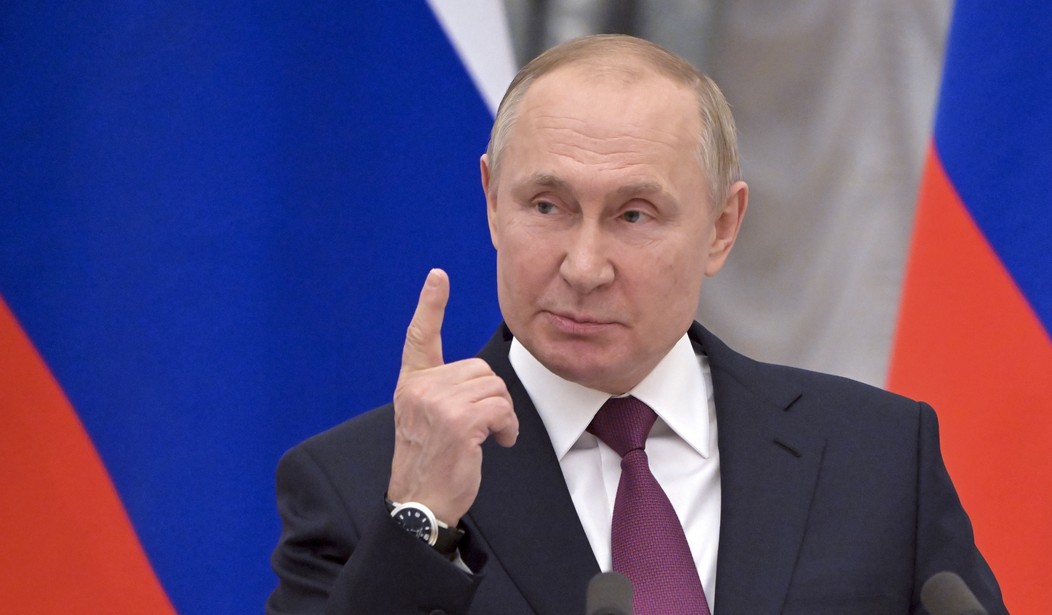Looks like ol’ Vlady Putin has outwitted us again!
Or has he?
First, watch this typically effective new bit of Ukrainian propaganda, which I’d call half-true.
Купуючи російську нафту та газ, ви фінансуєте вбивства українців. Дійте рішучіше. Досить годувати російську військову машину.
Польща, Литва, Латвія та Естонія вже відмовились від фінансування геноциду. pic.twitter.com/AhNB8LBgNP
— Володимир Зеленський (@ZelenskyyUa) April 8, 2022
Is it true that Europe’s ongoing purchases of Russian energy are buoying up the ruble and stabilizing Russia’s economy? Alas, yes.
Is it true that those purchases are funding Russia’s war machine in Ukraine? Not exactly.
The ruble crashed after the U.S. and other NATO allies slapped Russia with mega-sanctions last month, kicking multiple Russian banks out of the SWIFT financial transaction system and freezing Russia’s foreign currency reserves in the west. Joe Biden was so excited about it that he included this line in his speech in Warsaw two weeks ago:
"The ruble was almost immediately reduced to rubble."
President Biden speaks about the effect sanctions have had on Russian currency, saying the exchange rate from rubles to USD is 200 to 1, although the current rate is closer to 100 to 1. pic.twitter.com/H3FV9PAmlH
— Forbes (@Forbes) March 26, 2022
Fast-forward two weeks and, er…
The ruble is now worth more than before the invasion. Why is this happening with all the sanctions? 1/n pic.twitter.com/r2PEfFggR3
— Aslak Berg (@BergAslak) April 8, 2022
Sanctions were supposed to bring the ruble to its knees since Russia would be unable to buy up the currency to boost its value due to its foreign reserves being inaccessible. Instead they’ve taken our best punch and shaken it off. What gives?
One economist summed it up this way:
the pro Putin tankies are pointing to the rouble 'recovery' as signal that Russia is winning the war.
guys, with capital controls, I can fix the currency at about any rate I want to.
— Daniela Gabor (@DanielaGabor) April 7, 2022
The “capital controls” Gabor mentions refers to a raft of new policies in Russia designed to artificially inflate the value of the ruble. Until recently, the currency was freely traded internationally and so its value accurately reflected the balance between supply and demand. That changed after western sanctions were slapped on Russia. Moscow feared that the panicked Russian population would dump its rubles in exchange for U.S. dollars if not prevented from doing so, destroying the currency. So they issued new rules limiting sales: “Russians have been banned from extracting more than $10,000 of foreign currency, or moving cash to foreign accounts. On top of this, foreign investors have not been allowed to sell domestic financial assets.”
Importantly, Russia also issued new rules for businesses. Those that receive foreign currency in exchange for their exports are required to convert at least 80 percent of that currency into rubles, further boosting the ruble’s value. And European countries purchasing natural gas from Russia will have 100 percent of their payments converted into rubles by Gazprombank, the financial institution that serves Russia’s largest gas company.
On top of all that, Russia jacked up interest rates from a bit less than 10 percent to 20 percent overnight in February to encourage Russians to keep their money in Russian banks. That interest rate has since been cut to 17 percent, but it’s still nearly double what the rate was two months ago.
Put it all together and you have a package of incentives and restrictions creating artificially high demand and artificially low supply for a currency that has very little “natural” value at the moment. It’s aggressive market manipulation aimed at reassuring Russians and the Kremlin’s sympathizers abroad that sanctions haven’t worked, Russia is invincible, yadda yadda. But the policies are working insofar as huge amounts of money continue to flow into Russia every day for oil and gas, allowing Moscow to replenish its reserves and further boosting the ruble under the new currency conversion rules. That’s the point of the new Zelensky video up top. Europe is keeping Putin flush with money because it simply can’t find a substitute for Russian energy short-term.
Does that mean they’re funding Putin’s war, though? No, for a simple reason: In order for Putin to convert his oil revenue into new tanks and weapons, he needs foreign companies to sell him the parts to make those tanks and weapons. (Or to sell him the tanks and weapons outright.) Western sanctions prevent that, essentially making Putin a man with a wallet full of cash who’s found himself barred from every store in town. Economist Adam Tooze put it this way:
The revenue is still going to the Russians for the gas. But the reason why the Russians can’t buy semiconductors is that Taiwan Semiconductor Manufacturing Co. won’t deliver them anymore. And the reason why they can’t continue domestic production is that Mikron, Russia’s own leading semiconductor manufacturer, is also being sanctioned.
We’re in a kind of perverse situation in which Russia runs a huge trade surplus. They give us their oil and gas. They give us their good stuff. We give them paper claims. And right now we’re denying them the right to exercise the purchasing power that would go with those paper claims. It’s very difficult to see that situation sustaining for any prolonged period of time because either they’ll stop delivering the gas, which may be what the German political class is angling for, because it would be a lot easier to deal with if the Russians turned the taps off. Or, in due course, we are going to allow the Russians to spend these accumulated dollars and euros. And at that point they would, of course, derive an immediate benefit from the purchasing power they piled up during this period.
If western sanctions remain in place until the war is over, Putin should have trouble resupplying his troops. There’s always China, of course, but…
Supply chains to European Russia are a lot long, the Chinese product mix is different from the Western one and there is also the fear of secondary sanctions, which might make Chinese companies hesitant
— Aslak Berg (@BergAslak) April 8, 2022
So, yes, sanctions are working short-term notwithstanding the ruble’s rebound. If and when they’re eventually lifted, though, Russia will have lots of money saved up to go on a shopping spree. If you want to cripple Putin long-term, there’s no alternative to cutting off demand for his energy. Germany is working on it, and hopes to be free of Russian oil by the end of the year. Stay tuned.








Join the conversation as a VIP Member